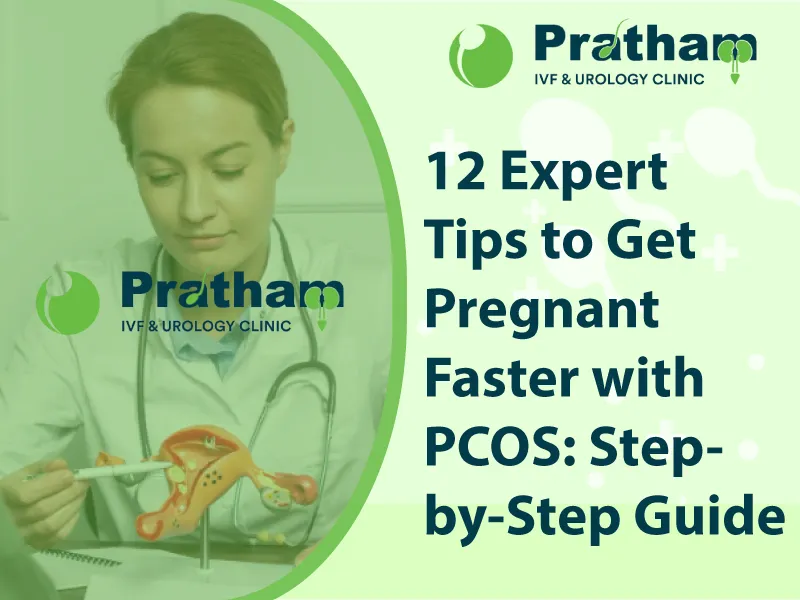
Many women are able to get pregnant. Begin by eating a nutritious diet high in whole grains, lean meats, vegetables, and fruits. Continuous workouts promotes sugar and regulates hormones. Tracking your menstrual cycle with ovulation kits or apps is essential, especially if your periods are irregular. Managing stress through yoga, meditation, or relaxation techniques can also support hormonal balance. Limit caffeine and avoid smoking and alcohol, as they negatively affect fertility. Consider supplements like folic acid, inositol, or vitamin D after consulting your doctor. If lifestyle changes don’t help, seek advice from a fertility specialist for treatments like ovulation induction or IVF. Patience and persistence are key—stay informed, involve your partner, and focus on small, consistent steps. With expert guidance and a proactive approach, you can increase your chances of getting pregnant faster despite PCOS.
Consulting a healthcare provider early is important for managing PCOS and improving fertility outcomes. A doctor can provide accurate diagnoses, customized treatment plans, and guidance to manage symptoms effectively. Seeking professional medical advice provides you with support and necessary interventions that significantly increase your chances of conception.
What is PCOS?
Polycystic Ovarian Syndrome, also known as PCOS, is a prevalent hormonal condition that affects women of reproductive years. It occurs due to hormonal imbalances, causing enlarged ovaries with multiple small cysts on their surface. Women with PCOS usually have periods that are inconsistent, increased hair on the body and face, weight gain, acne, and difficulties reproduction. PCOS disrupts ovulation, making fertility challenging. This also increases the risk of elevated blood pressure, diabetes, and cardiovascular disease. Managing PCOS typically involves lifestyle changes, such as diet, exercise, and medication, to regulate hormones and alleviate symptoms. Early diagnosis and proper medical care can significantly improve quality of life and fertility outcomes.
How PCOS Affects Fertility
PCOS can create various obstacles for women trying to conceive. The hormonal imbalance disrupts regular ovulation, meaning eggs may not mature properly or might not be released at all. Elevated levels of insulin and androgens (male hormones), common in PCOS, can further complicate fertility. This condition can lead to prolonged menstrual cycles, irregular periods, or even absence of menstruation, making it difficult to predict ovulation and optimal fertility periods.
Common Challenges in Conceiving with PCOS
Women with PCOS frequently face challenges such as irregular ovulation, difficulty tracking fertility windows, hormonal imbalances affecting egg quality, and higher rates of miscarriage. However, with the right lifestyle changes, medical interventions, and support, overcoming these challenges is achievable.
Tips for Improving Fertility with PCOS

Maintain a Healthy Diet and Weight
A healthy diet can be helpful for controlling PCOS and increasing fertility. Using foods that are high in nutrients such as freshly picked vegetables and fruits, whole grains, lean meats, and healthy fats will help to regulate insulin levels and treat symptoms related to PCOS. Incorporating fertility-boosting foods such as leafy greens, nuts, seeds, and legumes can enhance reproductive health. Maintaining a healthy weight reduces symptoms and improves hormonal balance, making conception more achievable.

Exercise Regularly
Regular exercise helps regulate insulin levels, reduce inflammation, and balance hormones, crucial for managing PCOS and improving fertility. Moderate exercises like brisk walking, cycling, swimming, or yoga are highly beneficial. Go for no less than 30 minutes every day for the best health and reproductive results.

Track Your Menstrual Cycle
Tracking ovulation helps women with PCOS identify their most fertile days, especially when cycles are irregular. Ovulation prediction applications and menstrual monitoring programs can be quite beneficial. Regularly monitoring helps in timing intercourse accurately, increasing pregnancy chances.

Consider Fertility Treatments
Different fertility therapies can help women with PCOS become pregnant. Ovulation-inducing drugs, insemination into the uterus (IUI), and in vitro fertilization are all options. Consulting a fertility specialist early on ensures timely treatment and higher success rates. Seek specialist advice if you have been trying unsuccessfully for over a year.

Manage Stress
Stress negatively impacts fertility by disrupting hormonal balance. Incorporating stress-reduction techniques such as yoga, meditation, deep-breathing exercises, and mindfulness helps significantly. Decreasing stress levels increases both fertility and general wellness.

Quit Smoking and Limit Alcohol Consumption
Smoking and excessive alcohol intake negatively affect fertility by impairing egg quality and hormone production. Quitting smoking and reducing alcohol consumption dramatically improve your fertility odds. Seek support or join cessation programs if needed.

Get Plenty of Sleep
Adequate sleep regulates hormones vital for fertility, such as insulin and cortisol. Aim for at least 7-9 hours nightly and maintain a regular sleep schedule. Create a calming bedtime routine, reduce screen time, and optimize your sleeping environment to improve sleep quality.

Take Supplements
Certain supplements, including folic acid, vitamin D, omega-3 fatty acids, and inositol, may improve fertility in women with PCOS. Consult with a healthcare practitioner before beginning any supplements to ensure proper dosage, timing, and compatibility with your treatment plan.

Consider Acupuncture or Other Alternative Therapies
Acupuncture and other alternative therapies can improve fertility by reducing stress, regulating hormones, and promoting blood flow to reproductive organs. Therapies like reflexology, herbal remedies, and yoga are beneficial complementary treatments alongside medical interventions.

Stay Informed and Educated
Understanding PCOS and infertility allows you to make more informed decisions regarding your fertility. Utilize reputable resources, medical literature, online communities, and support groups to learn more about managing PCOS and enhancing fertility.

Involve Your Partner
Involving your partner in the reproductive journey improves emotional connection and provides crucial emotional support. Communicate openly about feelings, expectations, and decisions. A shared journey significantly enhances emotional resilience and partnership.

Stay Positive and Be Patient
Maintaining a positive attitude and practicing patience are essential in coping with the emotional toll of fertility challenges. Stay optimistic, celebrate small victories, and engage in regular self-care. Emotional well-being is just as important as physical health in the journey to pregnancy.
Conclusion
Lifestyle adjustments, medical care, and mental health are all needed for managing PCOS to improve fertility. Maintaining a healthy diet, regular exercise, stress management, and proper medical treatment are key strategies. Schedule your appointment today for a personalized consultation with the fertility experts at Pratham IVF Center, Ahmedabad, and take the first step towards realizing your dream of parenthood. Let our dedicated team guide you through your fertility journey.
 Ahmedabad Top Rated IVF Center
Ahmedabad Top Rated IVF Center




